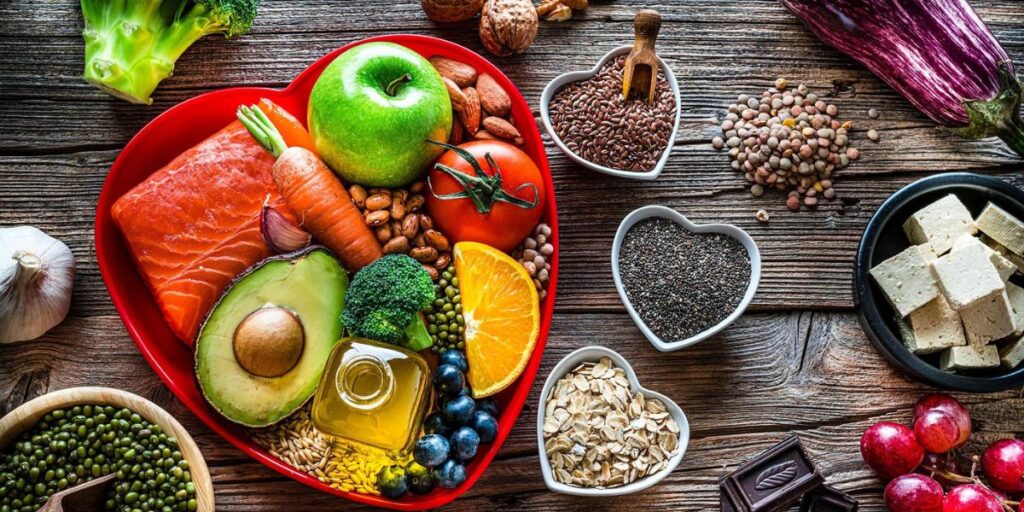Maintaining a heart healthy is crucial for overall well-being, and what you eat plays a significant role in promoting cardiovascular health. By incorporating specific foods into your diet regularly, you can enhance your heart’s strength, reduce the risk of heart disease, and improve your overall quality of life. Below, we explore nine heart-healthy foods that should become staples in your diet.
Heart Healthy Foods to Eat On A Regular Basis
Fatty Fish: A Rich Source of Omega-3 Fatty Acids

Fatty fish, such as salmon, mackerel, sardines, and tuna, are excellent sources of omega-3 fatty acids, which are essential for heart health. Omega-3s help reduce inflammation, lower blood pressure, and minimize the risk of irregular heart rhythms. Regular consumption of fatty fish has been shown to reduce the risk of heart attack and stroke. We recommend including at least two servings of fatty fish in your diet each week to reap these heart-healthy benefits.
Whole Grains: A Fiber-Packed Choice
Whole grains like oats, brown rice, quinoa, and whole wheat are packed with dietary fiber. Fiber helps to reduce cholesterol levels, control blood sugar, and maintain a healthy weight—all of which are vital for heart healthy. Unlike refined grains, whole grains retain all parts of the grain, providing more nutrients and improving cardiovascular health. Aim to make whole grains a regular part of your meals to support heart health.
Berries: Antioxidant Powerhouses
Berries, including blueberries, strawberries, raspberries, and blackberries, are rich in antioxidants such as anthocyanins, which protect your heart by reducing oxidative stress and inflammation. The high fiber content in berries also helps to manage cholesterol levels and support overall heart health. Incorporate a variety of berries into your diet by adding them to your breakfast cereals, salads, or smoothies for a delicious and heart-healthy boost.
Nuts: Heart Healthy Fats and Nutrients
Nuts, such as almonds, walnuts, pistachios, and hazelnuts, are rich in unsaturated fats, fiber, and plant sterols, all of which contribute to heart healthy. Regular consumption of nuts has been linked to lower LDL cholesterol levels, reduced inflammation, and a decreased risk of cardiovascular disease. A small handful of nuts each day can make a significant impact on your heart health.
Read Also- The 10 Best Deviled Eggs Recipes
Leafy Green Vegetables: Nutrient-Dense and Low-Calorie

Leafy greens like spinach, kale, collard greens, and Swiss chard are low in calories and high in nutrients, including vitamins A, C, and K, folate, calcium, and potassium. These vegetables are also excellent sources of dietary nitrates, which help lower blood pressure and improve arterial function. Adding a generous serving of leafy greens to your meals can greatly benefit your heart health.
Avocados: A Source of Healthy Monounsaturated Fats
Avocados are rich in monounsaturated fats, which are known to lower bad cholesterol (LDL) and increase good cholesterol (HDL). In addition to healthy fats, avocados provide potassium, fiber, and antioxidants that support heart healthy. Regular consumption of avocados has been associated with a lower risk of heart disease and improved overall cardiovascular function. Incorporate avocados into your diet by adding them to salads, sandwiches, or as a healthy spread.
Beans and Legumes: High in Fiber and Protein
Beans and legumes, such as lentils, chickpeas, black beans, and kidney beans, are excellent sources of plant-based protein and soluble fiber. These nutrients help lower cholesterol, reduce blood pressure, and promote heart healthy. Beans and legumes are also low in fat and can be a great alternative to meat in your diet. Incorporate them into soups, stews, salads, or as a main dish to support a healthy heart.
Dark Chocolate: A Treat with Heart Benefits
Dark chocolate, particularly varieties with a high cocoa content (70% or more), is rich in flavonoids, which are antioxidants that help reduce inflammation and improve blood flow. Moderate consumption of dark chocolate has been linked to lower blood pressure and a reduced risk of heart disease. However, it’s important to enjoy dark chocolate in moderation due to its calorie content. A small piece of dark chocolate as an occasional treat can provide heart healthy benefits.
Olive Oil: A Heart-Healthy Cooking Essential

Olive oil, especially extra virgin olive oil, is a cornerstone of the Mediterranean diet, known for its heart-protective properties. Rich in monounsaturated fats and antioxidants, olive oil helps reduce inflammation, lower LDL cholesterol, and protect against heart disease. Use olive oil as your primary cooking oil, and drizzle it over salads and vegetables to enhance flavor while supporting heart health.
Conclusion
Incorporating these nine heart healthy foods into your diet is a simple yet effective way to support your cardiovascular health. By making mindful choices about what you eat, you can significantly reduce your risk of heart disease and improve your overall well-being. Combine these foods with a balanced diet, regular exercise, and a healthy lifestyle to maximize your heart health benefits.
FAQs
Can I eat pasta and still lose weight?
Yes, when you choose high-protein pasta and balance it with healthy ingredients, pasta can be part of a weight loss-friendly diet.
What types of pasta are high in protein?
High-protein pasta options include those made from chickpeas, lentils, edamame, or whole wheat, which offer more protein than traditional pasta.



